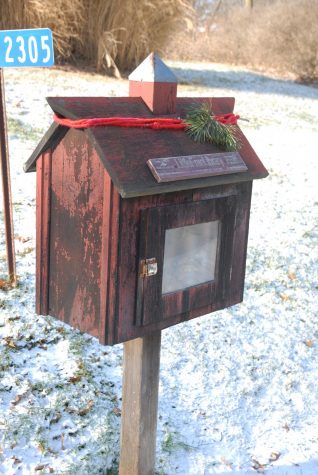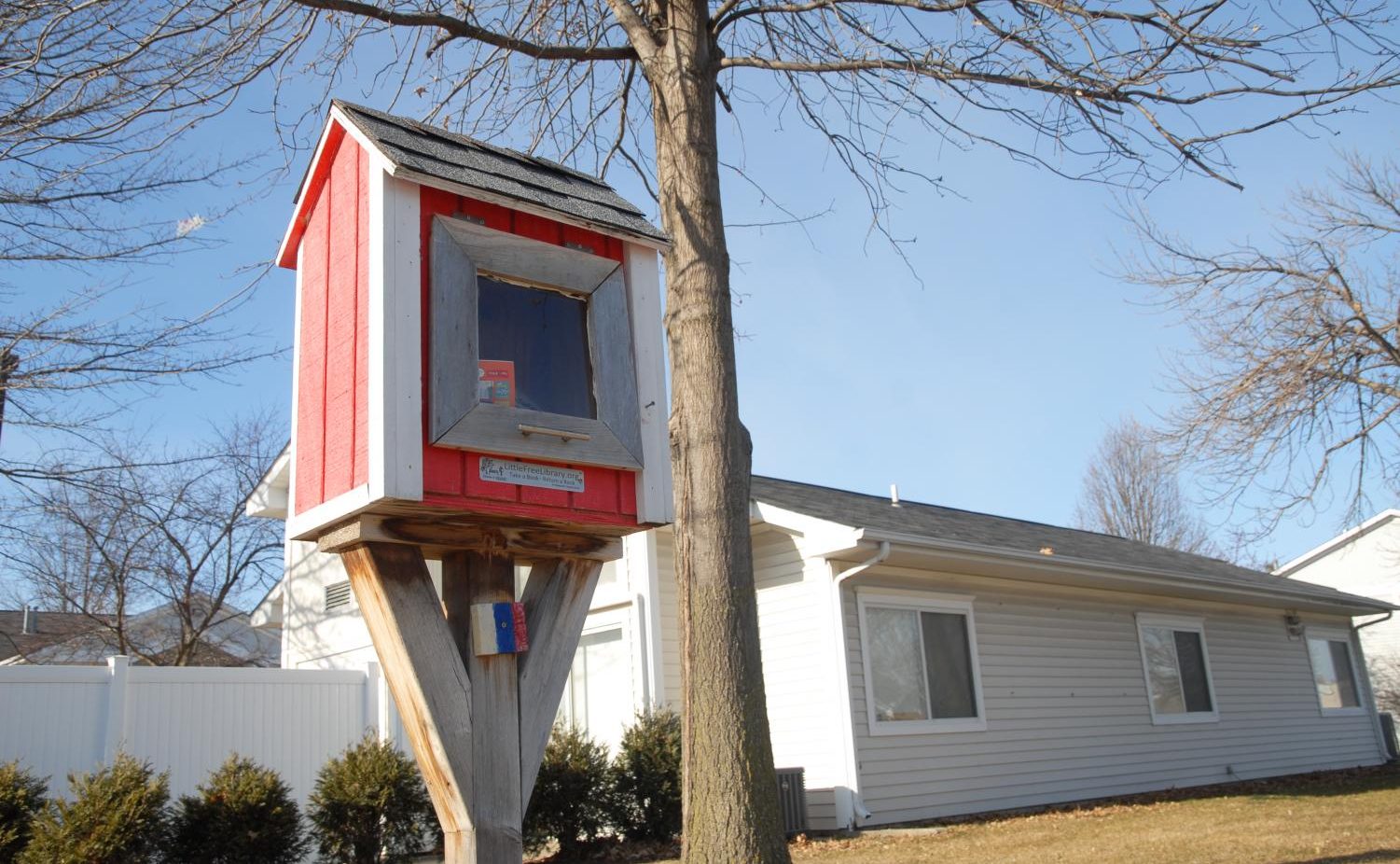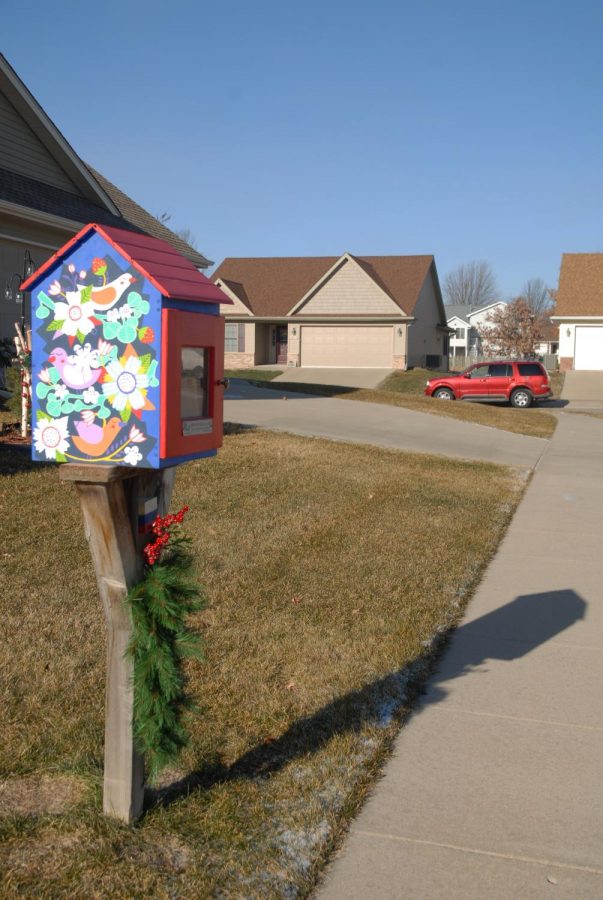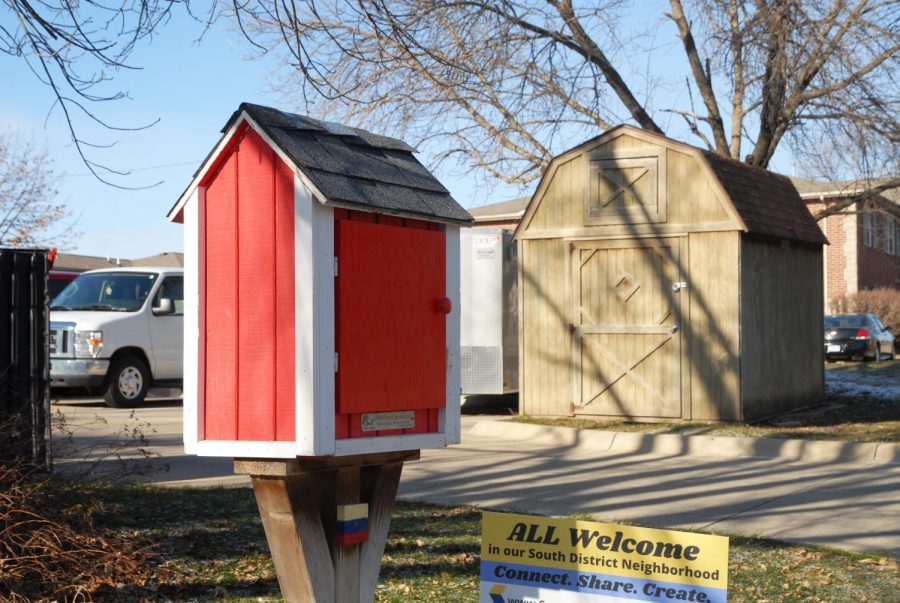Your donation will support the student journalists of West High School. Your contribution will allow us to purchase Scholarship Yearbooks, newsroom equipment and cover our annual website hosting costs.
Spreading joy, one book at a time
Four local Little Free Library caretakers, also known as stewards, detail the impact of the libraries.
January 5, 2021
As the home of the Iowa Writers Workshop and the only designated UNESCO City of Literature in the country, Iowa City is known for its appreciation of literature. It’s no surprise that a small project from Wisconsin dedicated to providing free books to the community, called Little Free Libraries, spread here.
Christine Rohret & Mary Mascher
It all started with a seemingly typical family gathering— sisters Christine Rohret and Mary Mascher, along with the rest of their female siblings, had met up to build birdhouses together out of wood from their father’s broken-down barn. It was a way to pay homage to him, and take a piece of their family back with them to their respective homes and communities.

Shortly after, one of Rohret’s sisters in Minnesota read an article about Little Free Libraries in her own community. She passed it on to Rohret, thinking it could be a potential use for some of the leftover wood. With a little planning and construction help from her husband, Rohret became the first LFL steward in the state of Iowa.
Located down Banbury Street in northeast Iowa City, the miniature library still stands eight years later, commemorating her father’s legacy.
“I’m an educator, and I’ve always been interested in literacy. My dad was kind of a self-made person too. It’s just great to celebrate that love and passion for learning throughout his life by continuing to provide avenues for people to get books, free of charge, to enjoy at any time,” Rohret said.
From there, the number of LFLs only multiplied. Mascher herself was inspired by her sister’s work, and when South District Community Organizer Angie Jordan reached out to ask if she would like to host a LFL of her own, Mascher readily agreed.
Like Rohret and two of her other sisters, Mascher had a job in teaching. With education being a key focus growing up, spreading knowledge in the community with the libraries is all the more meaningful.
“[My sisters and I] played school all the time; that was kind of our fun thing to do in the summertime. Our arguments became [about] who got to be the teacher and who were the students,” Mascher said. “Teaching has been a part of our families for quite some time, and it’s really an important part of our family, so that’s something that has been a motivation for me.”
Because of Mascher’s connection with elementary education, she most often puts children’s books in her library.
“I want kids to read, and I especially wanted kids to read over the summer with COVID and all the things we’re dealing with,” Mascher said. “I certainly get adult books that people put in there too, and I’m fine with that, but I especially focus on the kids.”
Mascher believes reading is not only essential for academic growth but also for entertainment and solace.
“I see books as an escape from the world that we live in, and right now, the books have been my salvation. I’ve probably read more books since COVID than anything, just because it gives me a chance to escape and get away from what’s going on in the real world,” Mascher said.
The libraries have been a great way for the community to stay connected even when everyone is far apart, according to Rohret. During the pandemic, community members have found new ways to help their fellow neighbors using the libraries.
“People have been able to add their own twist to it too, which is great in terms of art. I know some people switched theirs to food. They would put cans of food there with this whole COVID thing for people when they stopped, or they have a little dog treat area so that people walking their dogs can give a treat to their dog. They’ve added such fun additions to the whole idea,” Rohret said.
With all these new features, the buzz about LFLs has only grown over the years.
“I would say the activity in our library and the interest in Little Free Libraries has continued— we put ours out in February 2012, and that was the first one in Iowa … Every year I get more comments, questions about it,” Rohret said. “Questions are one thing that I always loved. And [my husband] responded to this [question] really well—‘What if people steal the books?’ And we said, ‘Well, there’s no stealing because they’re there for you. We aren’t expecting you to bring them back; that’s the whole idea.’”
Frederick Newell
Frederick Newell is the founder of Iowa City’s Dream City, a nonprofit organization dedicated to empowering fathers and their young children through support groups and other various events. Newell also runs a LFL, which serves as another way to help the community.
“One of the things that I tell our students that I get to work with on a daily basis is, reading is very fundamental … You need to be able to read to do any and everything. So for me, especially for young people, I want reading to be something that they love, because if they can love it now, then they will always be willing to put the work in to help you to get them to whatever level that they want to be at. Without being able to read, your opportunities are very limited,” Newell said. “One thing that I live by is being a lifelong learner. And so to be that, you must be a reader.”
One way Newell encourages reading is by making sure there’s a wide variety of genres to choose from, along with featuring diverse authors and stories.
“Recently, we just got a large number of books by Black authors so that kids within the community can read books by authors who hopefully they’ll have similar experiences with, and they can see themselves in the actual book,” Newell said.
While the libraries support reading and provide good representation for kids, according to Newell, they’re also impactful because they’re nearby and can be more convenient than going to a public library.
“Our library’s in front of two apartment complexes. One is on the left side of the street, [and] one is on the right, so it’s easily accessible. Once they’re done with the book they can put it back in. If not, they can keep it,” Newell said. “I believe that it’s helpful in a way that if you don’t have transportation to get to a library or somewhere to purchase the book, you can find a book within that free library.”
Because of these benefits, the library is used regularly and has become essential in the neighborhood as reported by Newell.
“There must be a huge need because those books go fast,” Newell said. “That’s one of the things that I love most about it. … Kids or adults, somebody’s taking the books, and I’m just hopeful that they’re reading it and then passing it along to share that information with someone else.”
Andrew Coghill-Behrends
The LFL down Broadway Street is situated right in front of another important resource for the community: the Broadway Neighborhood Center. This nonprofit is one of two locations under the Neighborhood Centers of Johnson County program. The centers have four central areas of focus, including early childhood education, before and after school care, family support services and youth programs like West High’s G! World. The LFL acts as a means to carry out these goals by providing equal access to education.
“This is a way for us to make sure that there are books accessible to kids 24/7,” said Andrew Coghill-Behrends, who is the Family Support Director, Broadway Site Director, and steward of the LFL for the Broadway center. “The books are always there, so if kids are looking for something for free, they can just come up to the center, and there’ll be something out there.”
Keeping close to this goal of childhood education, the Broadway Neighborhood Center LFL is mostly filled with children’s picture books and young adult novels. Along with checking to make sure the library is fully stocked, Coghill-Behrends ensures the contents of the library are family-friendly.
“We are a nonprofit, so we obviously can’t have anything political or religious in our little free library. Anything like that ends up getting taken out. Other than that, it’s just making sure that it’s in good repair and that everything that is in it is appropriate for children,” Coghill-Behrends said.
Despite isolation during the pandemic, Coghill-Behrends hopes the library is a way for the community to stay connected.
“Some sense of community and sharing is one of the things that is important right now. Even if we cannot be in close proximity to each other, we can still be borrowing a book or leaving a book for someone else to borrow. I hope that that sense of collective is something that is important,” Coghill-Behrends said.



